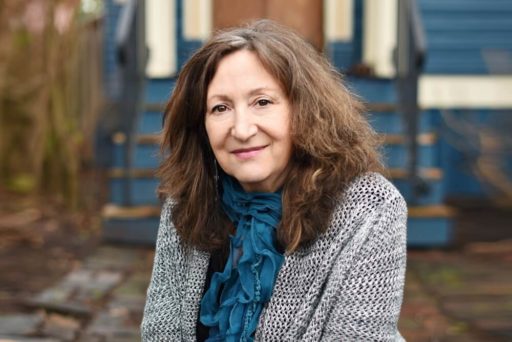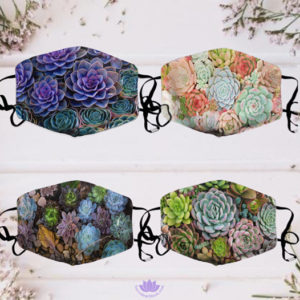We recently spoke with author Susanne Paola Antonetta about her new Slant book, Entangled Objects.
Can you explain the title? What does it mean to be entangled?
In physics, entanglement means quantum particles are connected in such a way that a change to one means instant change to all. This is true even if the particles are so far apart it would take years for any signal to pass between them. Bizarre in its way, but true! Entanglement is what Einstein called “spooky action at a distance.” It’s wonderfully strange but on the face of it simple. No one needs to know physics to read this book! Or even like physics.
Entangled Objects is an episodic novel that draws on that reality of quantum connection. It tells the story, weaving in and out of their narratives, of three entangled women. For most of the novel, these characters do not interact, yet their stories betray that mysterious and charming entanglement of quantum behavior. Their work, their obsessions, the turns they take emotionally, mirror and touch. Entanglement is a wonderful mystery. My characters live in that wonderful mystery. I think we all feel like we’re entangled with many things, some of which we understand, some of which we don’t.
To understand that the universe has this profound yet completely improbable connectedness is a beautiful thing. As is the phenomenon of the observer effect, the challenging fact that observing or detecting particles on the quantum level changes their state. My characters strive to understand their place in the world on that deepest level.
Tell us about these entangled women.
The first is an adjunct professor named Fan, the second a maid named Filomena—called Ef—and the third a reality star, Cate, whose smash-hit show stars herself and her family.
Situationally, my characters are very different. Fan, the professor, comes from a coal-mining family and is never entirely comfortable in her white-collar life. Her husband is a cloner who moves to Korea to try to clone human cells, which leads him into a morally complex situation.
Filomena is a maid who begins to steal clothing from the rooms of wealthy visitors, dressing up and haunting the hotel where she works, posing as a guest. She is obsessed with reality television, also an interest of Fan’s, and she also finds herself mesmerized by televangelists.
Cate, the reality TV star, the object of Fan and Filomena’s obsessions, is also at a crossroads. The reality show she has orchestrated begins to tear her apart. She sacrifices her husband to ratings, as his drinking grows worse and worse. Cate also begins haunting her world in disguise, without makeup, taken by the need to gauge her ability to affect the world.
Cloning is an important metaphor in this novel. These women essentially keep self-cloning—creating, trying on, personas that share DNA with but are not exactly the same as the selves they emerge from. And they face profound challenges to all the certainties they’ve held. When we face these challenges, we become in some sense different people.
It’s fascinating for a novel to feature such connected characters who nevertheless do not know one another.
Yes, though they do know one another. The great physicist Lee Smolin describes entangled particles as sharing a “perspective” on the universe. All these women try to understand the world that exists outside of them, its fundamental nature. They face inner crises but need to filter their spiritual needs through the physical world, changing it and their place in it, but also coming to understand it.
Like physics, reality television is an unexpected thread in the novel.
I’ve always been fascinated by the concept of an orchestrated reality, which reality television is.
Cate produces the show that stars herself and her family. She has editorial control, and chooses the roles each person involved will play, including herself.
Cate is in the remarkable position of looking at herself, the physical presence and physical self that the world has handed to her—as it hands such things to all of us—and then sculpting it. Remaking it. Her persona is in one way the most real and authentic self it can be, as it comes straight from her imagination. Whether it be with the help of plastic surgery, cameras, scripts, or whatever, the fictions she creates and the family she presents are the product of her own fantasies and her intuitions of what her viewers want. She is at once the most real and the least real person imaginable.
It would be easy to dismiss a character like Cate as shallow. She is anything but shallow. She anticipates with dizzying success what her viewers want of her. That connection is, in a sense, her ministry. As she tells us, she is not selfish; she gives and gives and gives. She learns to exist for others. At the same time, she demands an impossible sacrifice from the one she loves. She must take that sacrifice on herself.
You consider this book metaphysical, deeply spiritual. Yet it does not fit the parameters of “Christian novel” as the term is often used. How do these themes resonate throughout this work?
The term I use is a “stealth” book of faith. I wanted that faith theme to be essential yet nuanced in the book. I’ve always conceived of this novel as a Pilgrim’s Progress, with my characters making their way through various places that lead them to the moments of insight at the end.
The convergence place for the three women is a hotel, the Mariposa. The characters are, in different ways, coming to terms with the meaning of forgiveness, of acceptance, and of sacrifice. As well as their place in this at once very physical and very metaphysical universe.
I think there’s often an unhealthy divide between science and faith. Stephen Jay Gould described the two as the “non-overlapping magisteria.” Scientists don’t want their work made into easy metaphors; I get that. But I think people of faith can fall into the trap of glorifying creation without examining exactly what creation is. This to me is a terrible loss.
There are many pop cultural references in this book—reality television, glam rockers, televangelists. How hard was it to embrace serious realities through these media we all tend to dismiss?
Fan comes to believe that pop culture offers its own intuitive cosmologies. She is thinking about observership, one of the most challenging concepts in physics. Most of us in our social media, reality TV-driven culture grapple with how real we are when we are not seen, not apprehended by another co-creating consciousness. I mean co-creating in the sense that its gaze makes us at least partly who we are.
I tend to side with the scientists—who are giants, not woo-woo outliers—who believe consciousness is one of the fundamental forces of the universe. Giulio Tononi, David Chalmers, Philip Goff, many others. Giulio once talked to me about the centrality of consciousness in the world. At the end he told me that consciousness is “as deep as it gets.” I agree. God is the ultimate co-creating consciousness.
There’s sometimes an attitude among fiction readers and critics that exploring characters’ inner lives too much is somehow cheating. It should be all about the action. My characters have plenty of action. But it’s inextricable from what they think. We can’t put consciousness on the sideline. It is what is.
How did these characters first come to you?
The whole project started on a plane, as my family and I were flying home from Seoul. There was once a huge cloning scandal in Korea that involved human cells and faked data. I started thinking on the plane about how the wife of that cloner would react, how you would strike back at a spouse who kept such a terrible secret. And in Seoul my husband and I had peeked into a sarang bang. They are just so interesting, such a mixture of childlike innocence and eroticism. I also had been to a bathhouse and had somewhat of the same reaction as my character. Fan’s story started telling itself. I spent a lot of that flight glued to my notebook.
Also in Seoul, I noticed a man stumble out of an elevator and just miss the foot of a waiting woman. That memory ushered Ef into existence. In her storyline, a hotel guest smashing her foot leads to her longest impersonation of a wealthy woman. And her realization of that faking’s failure.
And Cate just came to me as Cate. She’s a force of nature.


